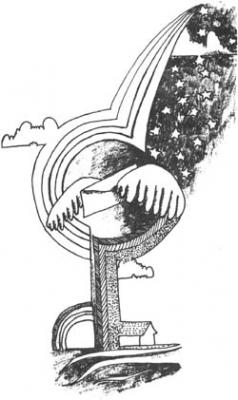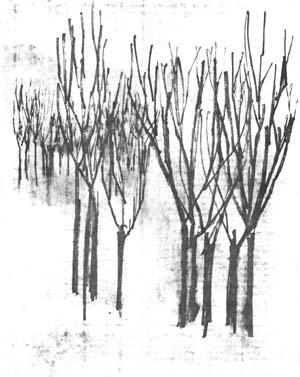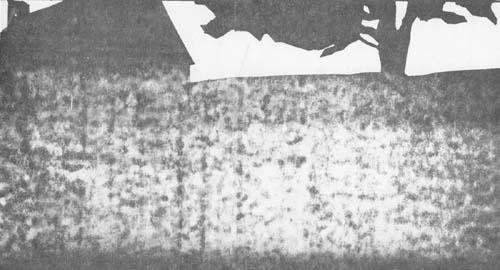New Burlington, Ohio: When A Town Dies - A Country Diary
New Burlington, Ohio: A Country Diary
I have come to live in New Burlington’s last farm house, surrounded by white brick and clean silence. I have come here to understand its death, my life. Nothing is revealed. I consider Ross McDonald and Agatha Christie, all mystery in the telling, and resolution before a fortnight. For a time, before the death of Lawrence Mitchner, I shared the responsibility of lastness, which is not to be taken lightly. Across my orchard, behind the drawn shutters in Lawrence Mitchner’s house, I could see a blue glow in the heavy tangible weight of a winter’s night. Some say he watched television. Others said not.
Not having a television set, I watch the seasons and the documentary of my neighbor’s existence, which takes place one mile to the south. My animals, however, outnumber my neighbors. The two sheep, Clyde and Lady Clyde, and I maintain an uncertain truce. I maintain also the water bucket and the hay maw. Clyde maintains his integrity: he will butt the hand that feeds him. I admire this, and so do not trifle with the affections of Lady Clyde, who is long-suffering. There is also the small frightened chicken who gives me an egg every day. I say the egg is a gift, but that is my viewpoint. A friend, given to obscure observation, has remarked that if men could do such a thing, guilt could be transformed into calcium and so dispelled into the straw of our circumstances and the earth would become a paradise. There is much mystery surrounding the egg. Such a mystery makes me believe in the presence of superior beings, such as angels, prime ministers, and newspaper editors.
There are also cats. For days they watched me from the barn beams, studying the grammar of my body’s english. They take food I leave, their presence in its absence. There are few manners it the flinty society of the hay maw. Last night a young grey cat followed me to the house, and bumped against my hands to be petted, strangely clumsy in an intimate moment between us. Then overcome by shyness, she ran away. I wonder if I steal her instincts with my friendship. I consider my own loneliness. I, too, have need of hands. For such grievances, I retain a skywriter, a leather-lunged fellow with a megaphone, and an antique drawer stuffed with the cries of endangered animals all caught in the moment when each recognized there was a reason he wintered alone. I am still curious about the soft yellow lights in the windows of small houses set back in fields, and other what passes to be natural phenomena.
I have made a floor-to-ceiling bookcase of eight-by-eight barn timber, fitted with pegs. Its texture pleases me. If I were a king I would decree that all surfaces remind us of our origins in uneven wombs of wood and clay and the rough weave of simple grass. The beams are so large and solid as to diminish the books upon them. It reminds me that barns were once songs.
In the vacuum between seasons I listen for sounds of my own health, and curse my hypocondria. Sharpening my rusty senses, I listen for the hum of the stars and watch for seams in the earth. At night, I keep the gate shut because the grass leaks out, and stones run. I awaken to irrelevancies: Pascal asserted that history once depended upon the shape of Cleopatra’s nose. Picture me so: here in late fall’s sharp mornings, racing over the untenable wood floors to revolve like a small wound-down planet in my irregular dancing little orbit around the sun of the woodsfire, one side fiery and gaseous, the other frigid and arid, me turning upon the rotisserie of myself, spitted to this lonely, barely tilleable earth.
The whole life is so complicated, like the conversion of fractions. Southerners convert to Baptists by route of fear. The conversion of fractions to whole is more difficult because fear has to be expurgated and the route is not shown on the careful maps of the American Automobile Association. I keep potatoes in the cellar, and tomatoes late from the vine. My plants twist in the windows. If I move many more times, I fear I will break in transit, like some porcelain heirloom. I never dream but I often awake tired, as if my mind has been a battlefield and armies of the night have come and gone before light, fighting over obscure geographies. Some mornings I feel stooped, as if bent by hods of brick, taxes, and old sins.
Weather: outer
Sunrise, 7:15. Character of the day, cloudy. There are alternate swings from the ambivalence of late fall to the deep chill of winter. In the country we are under the shadow of things the pale promise of science cannot affect.
Weather: inner
It is faintly precarious here, with a chance of widely scattered contradictions. Thursday, I sat under a sycamore in my shirtsleeves. Friday, I fell through the ice. If constancy is nowhere, how do we know how to behave? What for a model? I choose not to think of the future: I have nothing to wear. Gypsies selling small children and blankets bring rumors of a hard winter. It may he hearsay.
I recall the past spring, the land in basic green, the John Deere groaning upon the bottomlands, the transistorized young man riding her steely flank exchanging exhaust for real passion’s breath. Inside the sealed cab of the tractor, rock music played, souring the land. It could be heard for miles. I think the iron plow does poison the soil, and modern architecture causes cancer. Two bedroom houses seem foolish. I know something about the craft of building. Subdivisions are subject to a sterner gravity. It is said they do not stand well in high winds and other suburban disorders. The perversity of my nature being what it is, spring depresses me. I begin immediately to long for the more somber notes of fall, the stark symmetry and good taste of winter, where much if not most is left to the imagination. The landscape becomes heavy in the spring, forming a displaced tropics. In the event of its steamy vegetation, I become aboriginal, strip to a loincloth, and begin to hunt my own heart. July swings open like an oven door.
“And,” says my neighbor to the east, “he just made enough fodder to feed his horses. So somebody said, ‘Billy, why don’t you just get rid of the horses?’ and he said, ‘Why, I wouldn’t have anything to haul my fodder with...’” Things change, he says. “Some for the better and some I don’t know about.” My friend from the city says let us talk of the world of letters. I chose M,R,T, and the redoutable Y. Startling me with his literary brazenness, he chooses: F,S,C, and P. I search for my voice in books, the hay maw, and the throats of birds and small children. I think of going to Lexington, Ky., for treatment, to feel conversation shrink from me. To immerse myself in the language of weather and seasons. Perhaps: all art is chemistry.
The road to good intentions is paved with hell. Time in its measured slide down the far side of all our days. So much distance between points these days. The shortest line between two distances is a straight point. I look at the countryside with my well-trained realtor’s eye, looking for something well-turned among the rutabagas. Ample breastworks in a peasant blouse, in a land of peasant living. Breastworks a fortification sounding word. Fortification against the night. The Old Testament was wrong; it is infinitely better, given such options, to place your sperm into the ground and not the arid belly of the whore. If the flesh is unmoved, turn the earth with passion.
In the autumn, when the temperature sinks into the low 40’s, hairy David McKay and I load our axes in the back of his old Buick and drive across the stripped cornfield to the woods, confronted by a huge oak blown down by the wind. Many hours later, we are two ax-handlers poorer, but two cords of wood richer. The chain saw sits in the kitchen , humble now in its quiet but metallic rigor and intimations of hewing and hacking. My house is a paradise of work beckoning: vegetables for the stew; porch wood; furry manuscripts needing a little off the top; unbridled emotions to be cut down to size. The blacksmith says you do not appreciate a chain saw until you have used an ax. The chain saw was invented by a Jesuit as an instrument to test human perspective. What fine and proper work is delivered by the ax, stretching the body’s hidden fiber, provoking sobriety in front of the fact of a 200-year-old oak. With these rings (portraying health and disease and nature’s whimsy) I thee wed, honest awe to as much religion as I’ve ever had, an oak stump more pulpit than all the wood in a Methodist minister’s tongue. I worship here, presented with a proper mystery. I take sudden vows, become missionary in an always foreign land, come to teach the natives shame for the blasphemy of aluminum siding. Even a park is a crime against nature. A man of foundation gives me an old Arab proverb, ironic now in a faltering time: he who cuts his own wood is twice warmed. But bless him, old Arabs, and me and mine.
In this slipping down season, I am the curator of village bones. I stalk the countryside with formaldehyde in my eyes, entombing good talk. I am the bearer of tales, the keeper of the house, the shaman shaking imagery at disease. Preserver of tradition, I tan the hides of beasts with chicken manure and human urine. It works a subtle wonder in my occupation but tends toward an adverse effect upon my social life. I have walked from Virginia carrying a pear tree. I have cleared 15 acres of hardwood with a single-edged ax. In February, I will spike 15 more of sweet maple with wooden spiles and allow the season to bring sugar from them. I will judge my existence by how many farms I have worn out. I will lose an arm in the first threshing machine in my neighborhood, will give my wife the first linoleum carpet in the village, suffer from constipation, and choke to death upon a piece of meat. There will be no mention of this upon my marker in the cemetery, which will read that I rested only to work.


